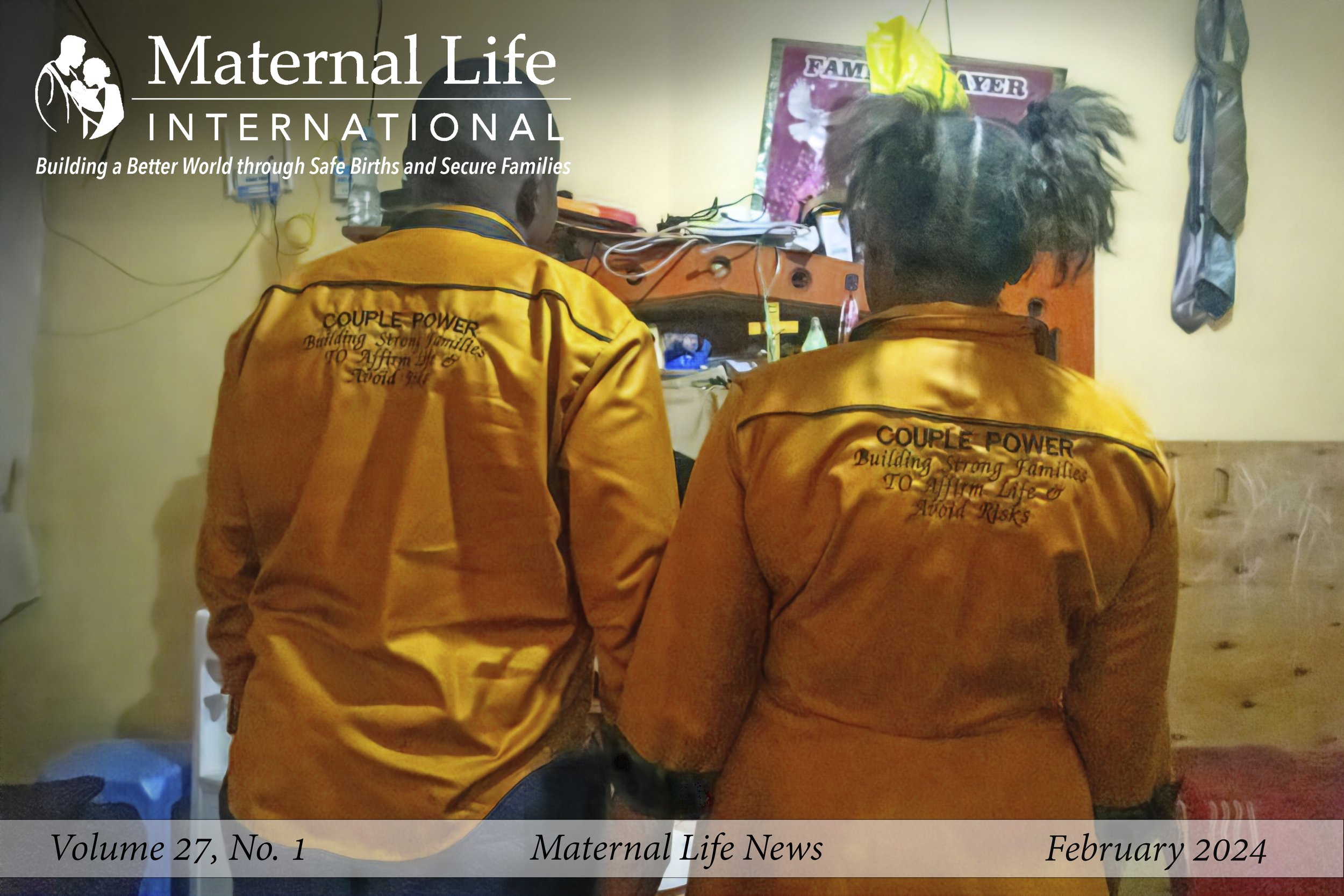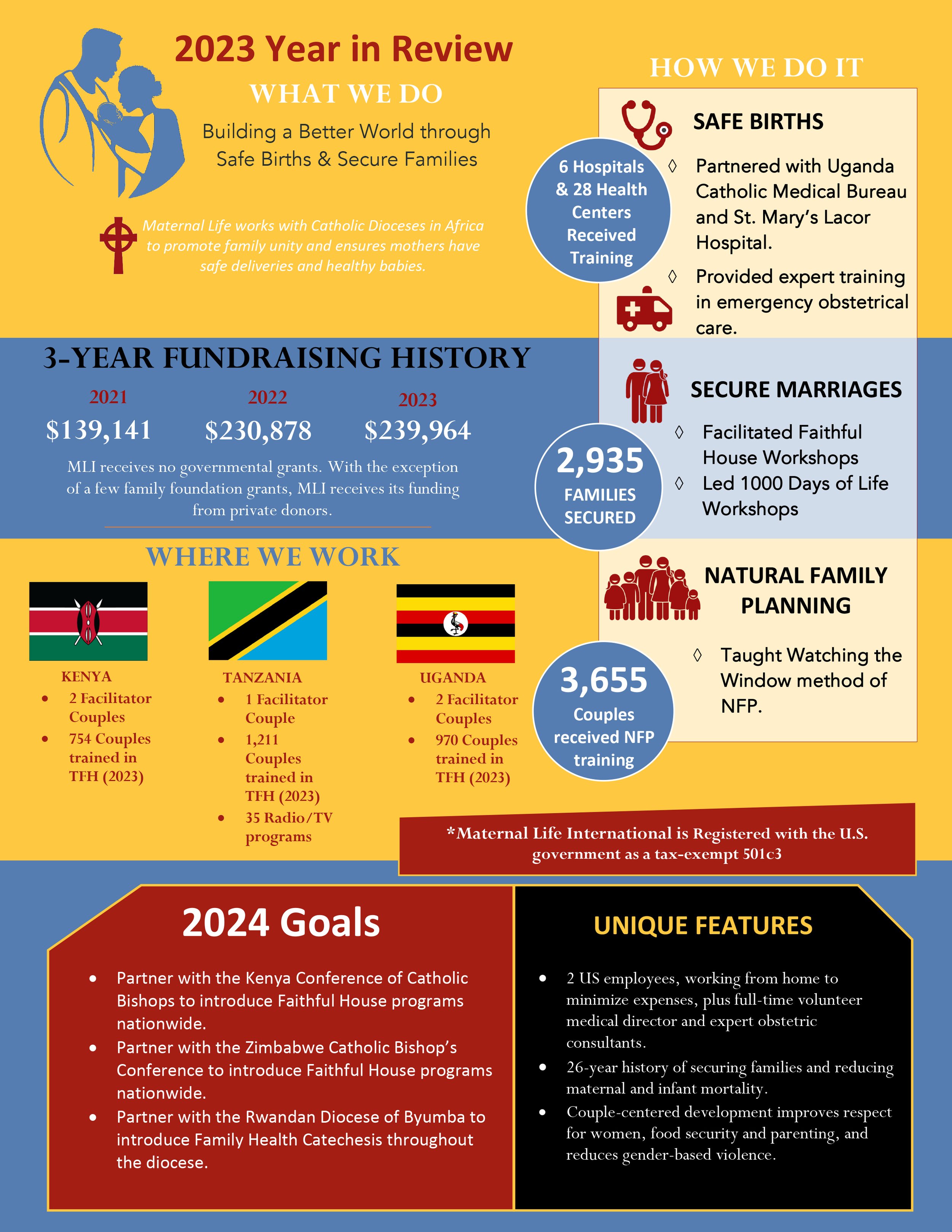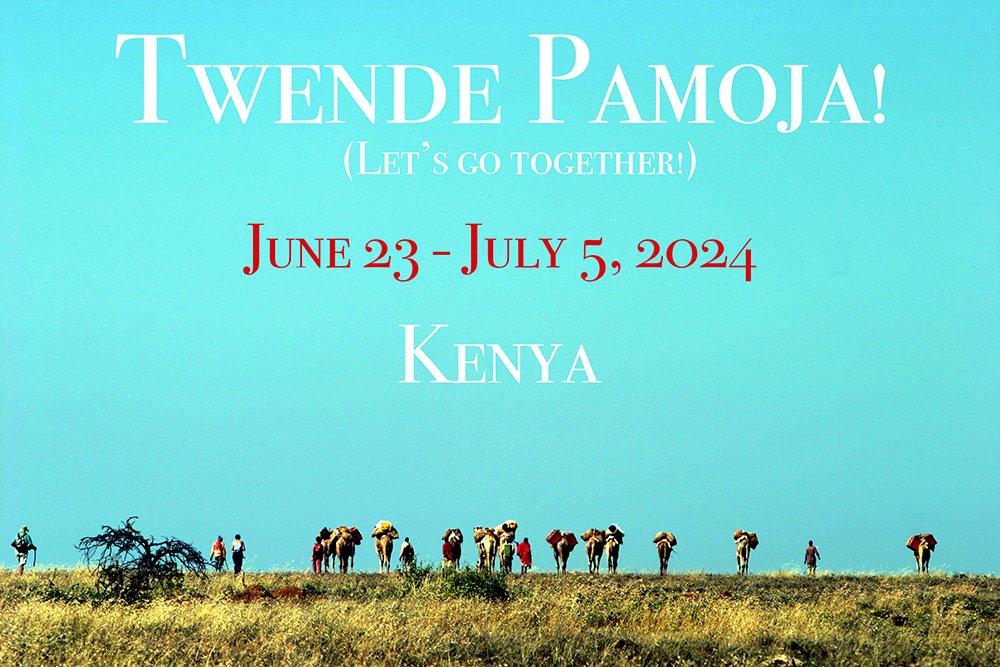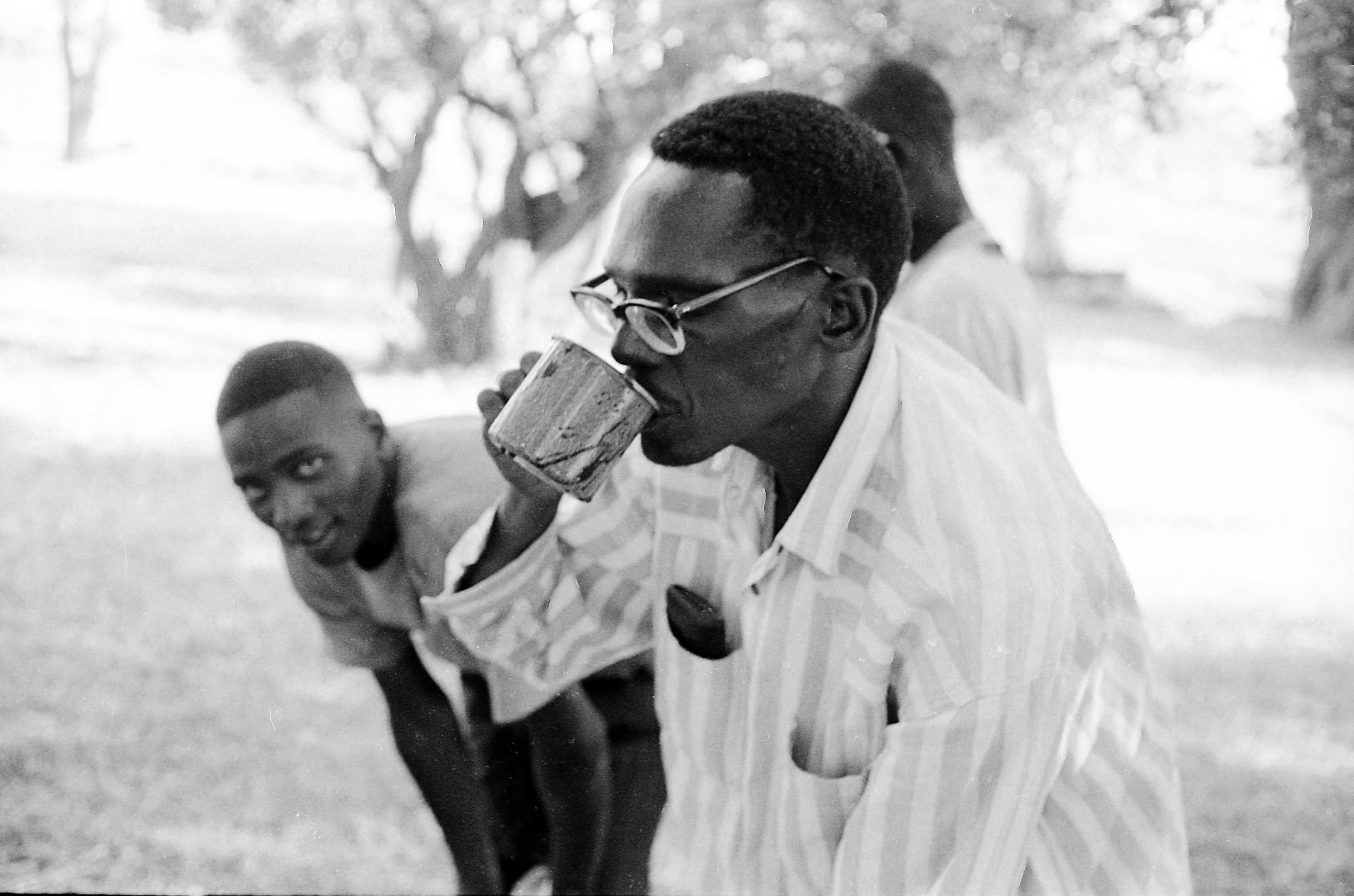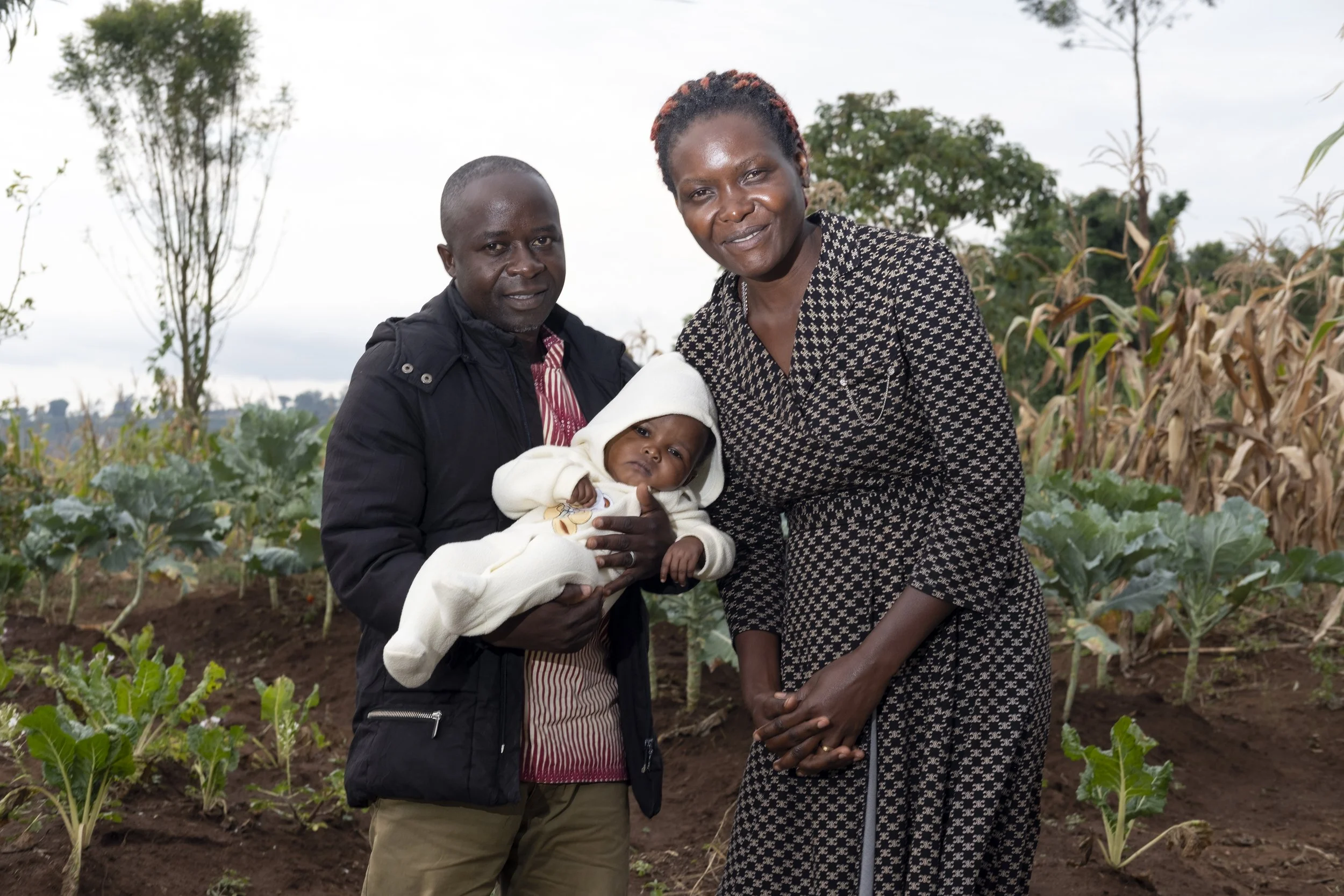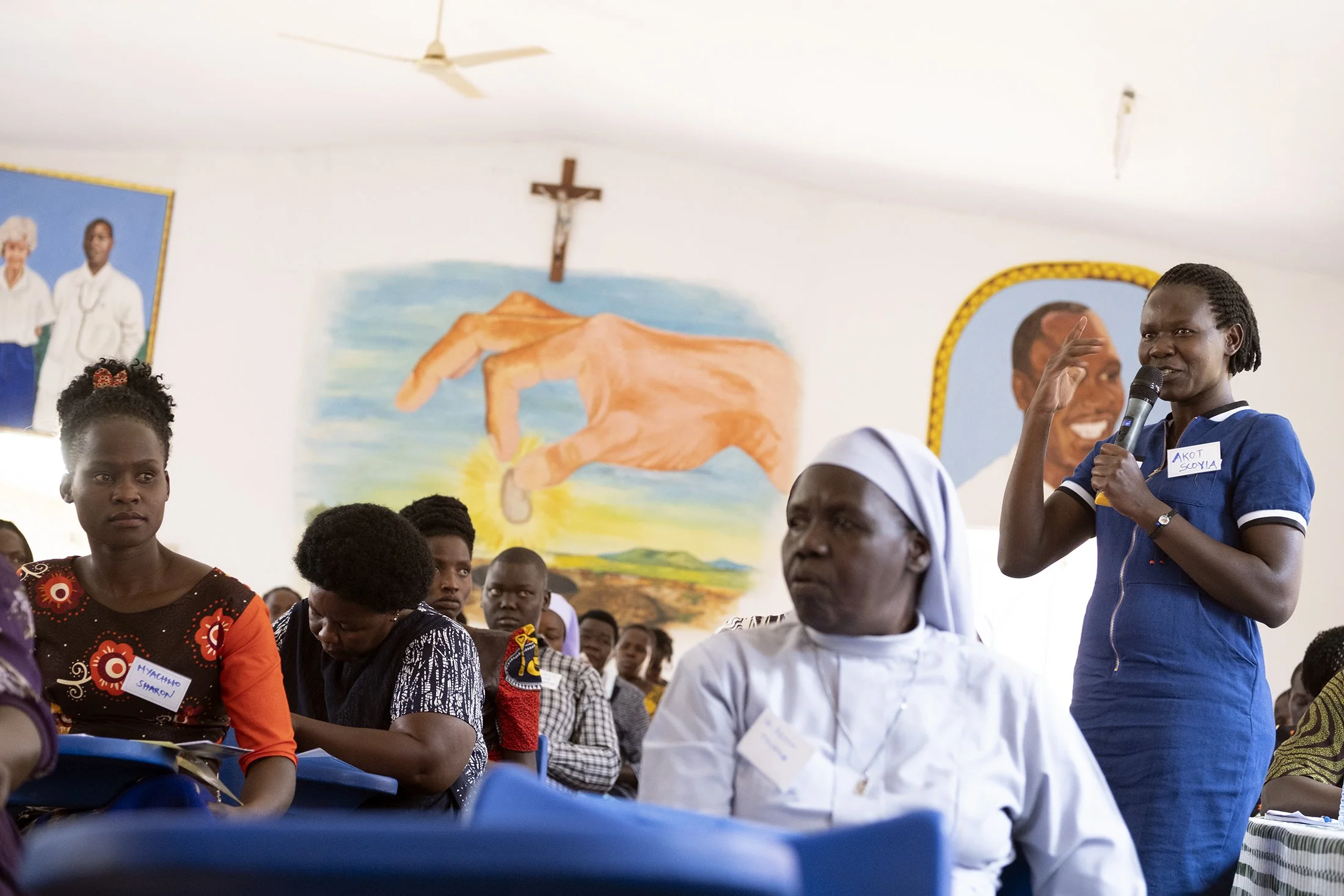Good Soil
By Hillary James
As our taxi driver navigated through the patchy dirt paths lined with tenement buildings on the outskirts of Nairobi, I marveled that Dr. George’s Faithful House curriculum, written in Montana back in 2005, has now reached even this haphazard, modest suburb on the other side of the world. We hopped over mud puddles to enter a simple apartment courtyard with laundry hung across the apartment windows to dry, and I met Edith, a Kenyan wife and mother of 4 young ones, and her husband Franklin who is a local teacher. Edith and Franklin welcomed me into their front room which serves as kitchen, dining and living room, with a small back bedroom for the whole family. Sacks of beans and rice lined the wall behind the couch, and a small pot with a kerosene stove sat in one corner, which gets pulled out a few times a day to prepare meals. Edith crouched on the linoleum floor as I arrived to warm some tea to welcome me into their home.
Edith and Franklin with their 4 children, and 2 neighbor friends.
Edith and Franklin, beaming as they introduced their wide-eyed children one by one, are newly trained facilitators in Dr. George’s Faithful House curriculum, which was introduced to them a few years ago at their local parish. They led a prayer of gratitude as I arrived, saying that they never could have imagined that the organization that brought happiness to their home would come to visit them. They explained to me that in Kenyan culture, a home visit is the greatest honor one can bestow on a friend.
Edith said that she was ready to leave Franklin before they joined the Faithful House program. He spent more time outside the home than with her, she said, and they were constantly at odds. She said that when the Faithful House came to their parish, “I was so keen to learn” that even though her sister was in the hospital an hour by bus from the church, she took the 2-hour trip every week to make sure she didn’t miss a lesson. The couple noticed almost immediate improvements to their family environment after the first class. Franklin said he learned how to take responsibility within the household, “which is different from our culture.” Throughout our meeting, he was holding their newborn son Promise in his arms. Edith said she learned that if she doesn’t communicate with Franklin, “my problems will overflow and my words will become sharp. If I communicate small things well, it can be softer.” Franklin and Edith’s children sat quietly throughout our time together, folding their hands reverently as their parents led us in prayer both at the opening and the closing of our meeting.
Franklin said, “In our culture we do not let you go without feeding you something.” Edith brought out buttered bread and tea with milk that they had prepared specially for our visit. How proud they were to offer us these refreshments, and how hungrily the children scooped it all up and licked their fingers for this special occasion. Franklin told us, “Our children can see the difference too. They may not be able to say it, but they notice that things are different between Edith and me.”
According to our Kenyan facilitator Njoroge, our programs have the most immediate impact on women. He said, “It is the women who notice the most drastic difference. For men it is more subtle.” That is because sharing in the care of children, saying “I’m sorry” after a disagreement and setting aside time to sit with your wife and talk are not culturally typical for most African men.
We also visited Michael and Grace, a couple with 3 children who live in a larger home outside of town. They went through the program as well and are now facilitators. They told us that they cover the cost of tea and printing of manuals themselves when they run trainings. It is a sacrifice, but Grace said, “We take seriously God’s call to spread His message of peace and love to others.” Michael said his greatest takeaway from the Faithful House has been to share financial decisions with Faith. For Faith, her biggest lesson has been learning to be reliable, and to be where you say you are to your spouse. Michael said they had never had a Westerner visit their home before and asked me to participate in planting a palm tree together along their entrance. It symbolizes the “flourishing of our family from the programs you have given us.”
What a privilege it was for me to visit homes impacted by Maternal Life where harmony is palpable. To see the eyes of families with few material goods, but rich in familial love, reminds me that there is no greater way to impact a person than to bring more love into their home. It is a privilege to be a part of Dr. George’s vision for healthier and happier families in parts of the world without any mental health or counseling services.
News of our impact is growing. Both the national Catholic Family Life offices in Zimbabwe and Kenya have asked us to partner with them to offer Maternal Life’s programs throughout the country. Our only limitation is raising the funds needed to roll out our curriculum. Will you join us?
As I get along in years (full disclosure, 68 of them), I continue to be astonished by the world and the people in it. Not sure how I ended up in the village of Gihengeri, Rwanda. Gihengeri means “good soil” in Kinyarwanda. Reaching there, Hillary and I were met by over 100 people, the vast majority of whom were couples whose livelihood was growing beans and maize. Women came out in their best with brightly, multi-colored, “wrappas”. Men were a mix: the dress included ill-fitting suitcoats, mud-covered farm boots, a couple of Christmas-themed ties and a man wearing a beat-up cowboy hat – amazing what finds its way across the ocean. What was common to all was their sincerity.
They had come to thank us for The Faithful House program which had been embedded in their parish. Through your generosity, we also provided much needed food relief to Gihengeri during Covid and the economic lockdown in Rwanda. They had not forgotten and with light in their eyes, said over and over, “May God bless you.”
The short visit we had planned took on a longer life: a few speeches and, at their request, an impromptu Faithful House course. I first asked the men, “If you went to the market what is the best gift you could get for your wives?” and then posed the same question to the women “What is the best gift you could get for your husbands?” The top answer for both was---shoes! We turned the question into a deeper reflection, and agreed the best gift they could give each other is their togetherness. Couples of all ages shared their experiences: young couples telling how both husband and wife now help care for their children, a wife standing by her sick and aging husband saying how she helps to feed him. Some of them had formed cooperatives to assist each other as they improved their houses or worked their farms together. What is growing in the good soil of Gihengeri is transformative.
Full disclosure, I don’t cry easily. Yet, seeing these people and feeling in the deepest part of my heart the unity we have in the Body of Christ, more than a few tears came, mixed with the life-giving rain that fell as we left. Let’s keep up the good work. There are thousands of Gihengeris out there.
Twende Pamoja!
by Jeff James
Twende Pamoja is the name of our charity walk in Kenya. It’s a walk to raise money for our work in fortifying struggling families and improving birth outcomes for women and children in some of the most resource-poor places in the world. It is a walk that will change how you experience the world for the rest of your life. In Swahili it means “Let’s go together.” We currently have a group of 6 walkers signed up. We need a minimum of 10 in order to make it happen. I hope, in the following passages, to inspire you to join me on this walk.
So why name a charity walk ‘Twende Pamoja’? First, it was one of the first Swahili phrases I learned in 1997, when working as a teacher in a remote area of Kenya. It was a period in my life where I was feeling quite lost. I had fled my hometown of Baltimore after a failed relationship and volunteered to work at this boarding school in Kenya. I was emotionally beaten down, in poor physical health, and without a friend or family member to seek out for comfort.
John Asekoni in the garden.
The school’s gardener, a tall and thin man, seemingly frail but deceptively powerful, took some interest in getting to know me. He wore coke bottle glasses, which magnified his already large eyes, accentuated by the shrunk-wrapped skin that revealed every contour of his skull. He spoke slowly and softly with impeccable English, and he had a textbook knowledge of all the flora and fauna of Kenya. He was my first Kenyan friend, and his name was John Asekoni.
John would invite me into the garden to work with him, teaching me Swahili and about soil acidity and alkalinity, explaining that in the central highlands of Kenya, our particular soil was called a nitisol soil, meaning it was produced from volcanic rocks around the slopes of Mt. Kenya. He explained that it needed to be enriched with manure for agriculture, and each day he would walk to the local Masai village, about a kilometer away, and gather as much manure as he could carry in a burlap sack, lugging it back to mix into his garden beds.
John lived about 5 kilometers from the school, and at the end of every school day he would walk back to his village. Often he would call to me as he was leaving, “Jeff, twende. Twende Pamoja!” At first, I was hesitant to venture far from the school, my home, for I was culturally and linguistically ignorant and felt safest within the fenced compounds of the school. So I would just smile and wave and send him off with a “Kwaheri, rafiki. Tuonane kesho,” (Goodbye friend. See you tomorrow), phrases I learned from my time with John in the garden.
But as time passed, I became more confident and adventurous, trusting in John and enjoying his company. So, when he called, “Twende pamoja” at the day’s end, I smiled and walked with him to his village, Nabor. The village consisted of about 20 square, mud-walled homes with rusted and corrugated metal roofs. It had a couple of small dukas (shops) where you could buy cigarettes, soap, matches, batteries, and sacks of flour for chapatis, and it had one bar. The bar’s floor was dirt, mounded and ridged by the water when the rains streamed through. Every table and chair sat lopsided due to the uneven floors, so you needed to keep a hand on your drink to keep it from sliding off or falling over. The Tusker beers were stored in about half-a-meter deep hole, dug into the floor to keep the beers cold. The bar had a television, powered by a car battery, and it picked up one television station that either played soccer matches or reruns of “The Bold and the Beautiful.”
On weekends, I would walk to Nabor to hang out with John, and we would watch television, teach each other about the nuances of our countries and cultures, and laugh about the caricatures of Americans in that soap opera, and how Kenyans assumed that they were accurate depictions. Those were glorious times, and I sure miss them and my friend John.
John died of AIDS a few years after that - a disease he never knew he had. The nearest clinic was 30 kilometers away, too far away to seek medical help when one got sick, especially when your primary form of transportation is your feet. Much has changed in Africa in the 27 years that have passed, but for the rural poor, access to quality health care and transportation is still a major issue. To this very day, people will opt out of seeking health care because they are too sick to walk, and the costs are prohibitive. A pregnant women will often choose a home birth with an unskilled birth attendant, rather than take the arduous journey to the nearest health center. Sometimes this works out, but when a complication occurs, the outcome is often fatal for mother or child, or both. Even if she makes it the local clinic, her chances of survival are poor, as most rural clinics lack the tools and training to stabilize a patient in order to transport her to higher level care.
This is where Maternal Life comes in. With our Safe Passages program, we train nurses, midwives, and physicians in emergency obstetrical procedures, providing equipment to help diagnose and stabilize a patient so that higher level care can be reached, and lives can be saved. In our ‘Faithful House’ program, we urge husbands to be more involved in the journey of pregnancy, being present for antenatal care and for the delivery and birth of their child. Data shows that when a woman has an involved and supportive partner, health and birth outcomes are dramatically improved. And in our ‘Journey of a Thousand Days’ program, we teach couples that those first thousand days of life, from conception to year 2, are the most critical time in human development. What occurs in these first thousand days may bless or haunt a child forever. A healthy first thousand days establishes a solid platform for the physical, mental, and relational health of children that will last them for the rest of their lives!
Twende Pamoja is a walk of solidarity for those who must walk for survival. Make no mistake, it is not a “walk in the park.” It is an adventure for a cause. We will be walking many kilometers over a 7-day period. We will walk over land that many people have traversed seeking food, shelter, and health care. Our walk will not only remind us of our blessings, living in a society rich in resources and access to health care, but it will bond us to those who are not as fortunate. We will do it safely, having camels to carry our gear, guides to show us the way, food to nourish our bodies, and solidarity with our fellow walkers – people who have a heart for the poor, and a mission to serve.
Twende Pamoja will take place June 23 – July 5 in Kenya. Let’s go together!
Maternal Life News - The Christmas Edition
By Jeff James
Several years ago, I met a group of tailors in a small fishing village in Kenya. At the time, they were each working independently to provide for their families by making school uniforms, dresses, and suits for the community. In a tiny town with numerous tailors, competition was stiff, and making a decent wage was elusive. Some of them couldn’t even afford to pay the school fees to send their children to school. All of the women were widows who had lost their husbands primarily to HIV.
Several years ago, inspired by the potential for a broader client base abroad, these ladies banded together to form a seamstress cooperative, creating interesting items with their colorful, distinctly African fabric prints. Due in part to the market that has sprung up from a few of us American clients, the ladies have improved their lot, now sending their children to school independently and expanding their businesses and storefronts.
This year, for our second annual Christmas fundraiser, they made us these outstanding little bags that fit in your purse, or in the glove box of your car, but when unzipped and folded out they transform into a large carry-all shopping bag. They are sturdy with long looped shoulder straps, and when your bag is unloaded, they fold back up and zip closed for the next shopping trip. They are washable, colorful, and make a fashion statement that screams, “I come from Africa!” They make a great Christmas gift for your friends and family. They’ll put a smile on your face, as you know that your gift is empowering some very needy women who have talent, but little opportunity to advance their lives.
I wanted to remind you about this rare opportunity to see firsthand the empowering work MLI is doing to support families crippled by extreme poverty, and to see Kenya as few have seen it – on foot, traversing pristine landscapes teeming with wildlife.
A few updates: Instead of May 2024, late June to early July seem to be a better time for most interested walkers. It is a 7-day walking safari, accompanied by a team of camels to carry our camping gear. That’s right, we camp, which is much more invigorating than a posh safari camp at the end of a long day. The current approximate costs are $3,000 per person for the safari, travel insurance, transportation, food and lodging before and after the safari. This does not include round-trip airfare. In addition, we will ask each walker to fundraise between $5,000 - $10,000 to support the work of MLI.
If this adventure and cause speaks to you, please fill out our online application. Deadline for sign up is February 1, 2024, and we will ask for a $1,500 deposit to secure your place on the Twende Pamoja walk.
Eveline & Jude
One of our greatest passions and our cornerstone program is called The Faithful House. You’ve probably heard of it, but it’s worth repeating the power of this program, healing families and fortifying them against the tribulations of the day. As our longtime followers know, The Faithful House is aimed at protecting and nurturing families, especially those under the hardship of extreme poverty.
In February, I spent time with a couple in Uganda named Eveline and Jude. They participated in The Faithful House training 10 years ago, and its effects on their family life endure today. When asked about what life was like for them prior to the training, they told me that Jude was an absent father, Eveline an overworked mother, and their children craved the attention of their parents. Neither Eveline nor Jude had received good parenting examples in their childhood. Both of them came from polygamous families. Jude has 24 siblings, nearly all of them from different mothers. When Jude was growing up, his parents did not invest time in knowing their children for their ideas or in preparing them for the future. Eveline said from the time she was born, she never received a hug or any affection from her father. It was just the way things were, but it stunted her emotional development, to the point that she feared falling in love and trusting any man with her heart. For this reason, although together for more than 20 years, the couple only married officially after being trained in The Faithful House. She saw a different man and father emerge from that program from the Jude she had known before, and she knew that he would care for her as she always imagined a husband would. Today, they are thriving beyond all their expectations.
You can meet Eveline and Jude and hear them in their own words and the bottom of this post, and on our website and social media pages. Find “Maternal Life International” on Facebook, YouTube and on Instagram to hear them for yourself. We are sure you will be inspired.
The Faithful House program is important now more than ever. In our living memory as well as in the roots of the last century, we have seen damage to the traditional family play out in the sexual revolution, resulting in the current state of affairs in the West regarding marriage and faith, and the definition of the family. When life becomes about the quest for self-fulfillment instead of God, a variety of pursuits try to fill the void. Lost in its wake is the expression of self-sacrificial love within a family, a commitment firmly grounded in the divine. Rediscovery of this kind of love is a vital antidote to Western society’s current ills, a darkness which we see all too often with a quick look at our daily newsfeed. Crime is increasing, an epidemic of fatherlessness proliferates, addictions to stave off feelings of hopelessness is commonplace.
Unfortunately, despite being somewhat insulated from the current trends of Western culture, Africa, and families like Jude and Eveline’s, are under threat. There is a well-funded push for this alternative view on human life and sexuality that is being promoted in Africa. Some Africans call it the ‘new colonialism.’ Foreign aid is tied to promoting social causes, like abortion, and other causes that undermine traditional marriage and family. As the late Holy Father John Paul II said, “As the family goes, so goes the nation, and so goes the whole world in which we live.” When living under the hardship of extreme poverty, it becomes all too easy to accept conditions that will ultimately destroy the very fabric of your society.
What we need is a renaissance of the cooperative kind of love and faithful marriage illustrated by the witness of Eveline and Jude. An intact faithful family can adapt superbly to changing economic and political realities. In fact, in our experience, we’ve seen husbands and wives pull themselves out of the direst situations, with no increase in income, simply by learning to work together in financial management, by planning their families together, by sharing in all family activities, from household chores to educating and raising their children, and above all, by placing God at the center of their lives. Please meet Eveline and Jude by watching our video and remember the countless couples who have been similarly transformed because of your support of MLI’s work. Thank you!
Mark your calendars, folks! We are embarking on MLI’s first annual, once in a lifetime opportunity to experience Africa as few have seen it. We will step off on a 7-day charity walk in Kenya, traversing some of the most pristine geography in the world, tent camping among God’s creation with camels walking alongside to carry our gear, and sharing an adventure with like-minded people who have the heart for MLI’s transformational work. It will also offer a chance to see in action MLI’s powerful work to nurture secure families and safe birth. We will introduce you to our program partners in Kenya and you will hear first-hand from many whose lives have been transformed from your support. The process of walking continuously for 7 days has great significance. We walk in solidarity with all those children who walk miles to fetch water and find sticks for firewood for their families each day. We walk in solidarity with those pregnant mothers who struggle for hours to reach a safe facility to give birth. We walk in solidarity with those fathers who must awake before sunrise to find work that will supply their family with a sustainable wage. May the steady rhythm of our steps mirror the steady rhythm of the heartbeats of all those families in Africa who are healthier, more secure and more prosperous because of our walking. We are looking for 10 of our most adventurous supporters to join us on this trek, people who have the time and resources to make the journey, and the passion to help us fundraise for this mighty cause. Our goal is to raise $50,000 through our communal efforts, so that MLI can take our programs to new locales where marriage, birth and family suffer from the hardships of extreme poverty.
If this adventure and cause speaks to you, if you have always wanted to visit Africa and if you want to have a greater appreciation for this cause, please contact Jeff at maternallifeinfo@gmail.com for more information. Perhaps you’d like to embark on this walk for families with a family member of your own at your side. Even better!
Twende Pamoja!!
SPEND A FEW MONTHS IN RWANDA
We are looking for an adventurous volunteer to spend a few months in Rwanda working with our partners on a new project there. We have been invited to introduce our family life curriculum to the diocese of Byumba, and are hiring a local couple to serve as facilitators. Our volunteer will work alongside the couple and officials in the diocese, helping to organize the roll-out of the program, making sure deadlines are met, and helping us with grant updates and reporting. Are you a public health professional, nurse, or highly organized individual with experience abroad? Do you happen to know French? Are you interested in spending a few months immersing yourself in a new culture and helping promote safe birth and secure families in Rwanda? Then we are looking for YOU! Give us a call at 720-320-4284 or fill out an application. We look forward to hearing from you about this unique opportunity.
Mother
By Dr. George Mulcaire-Jones
Dear Friends of MLI,
Mother’s Day holds a special significance for us at MLI. Truly it is mothers, both physical and spiritual, who “adorn the world with the richest colors of love.” Each of us is so grateful to our biological mother, our spiritual mothers and to all women whose dedication to God, to life and to the good of others is a shining star bringing light to the world. Thank you!
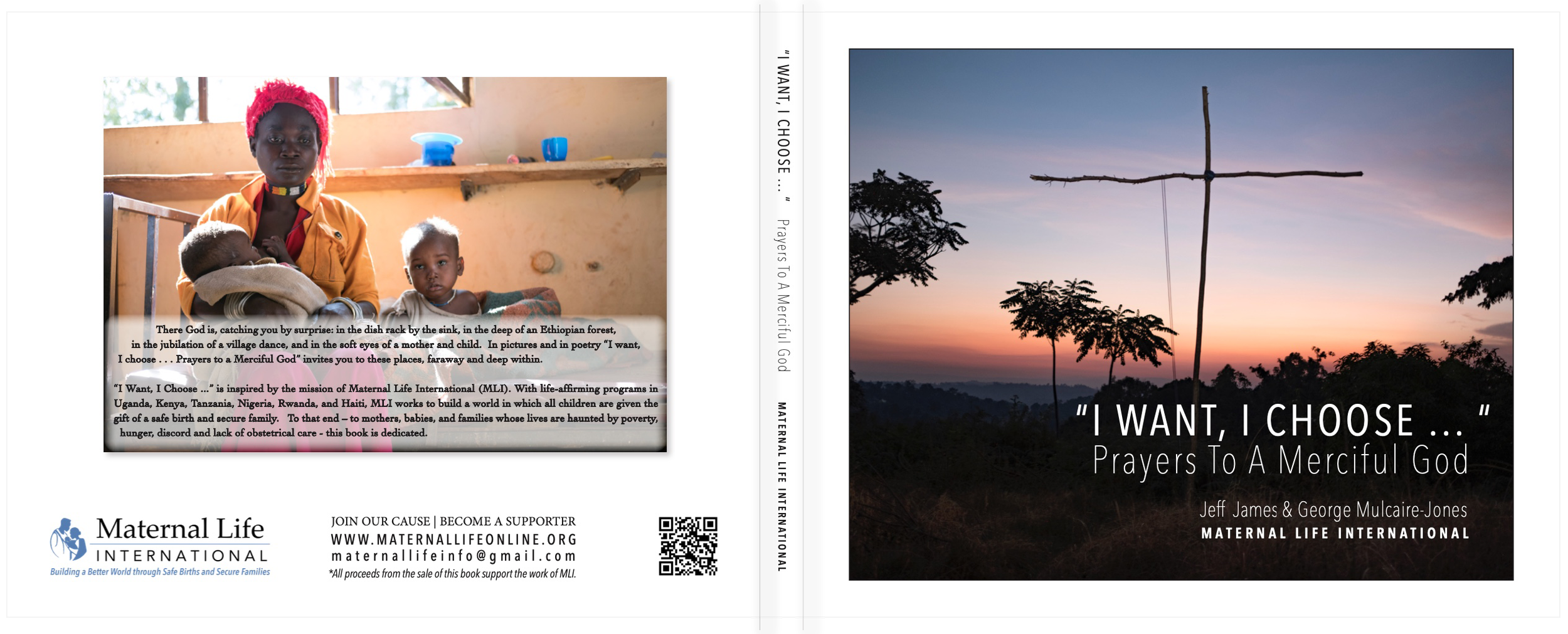
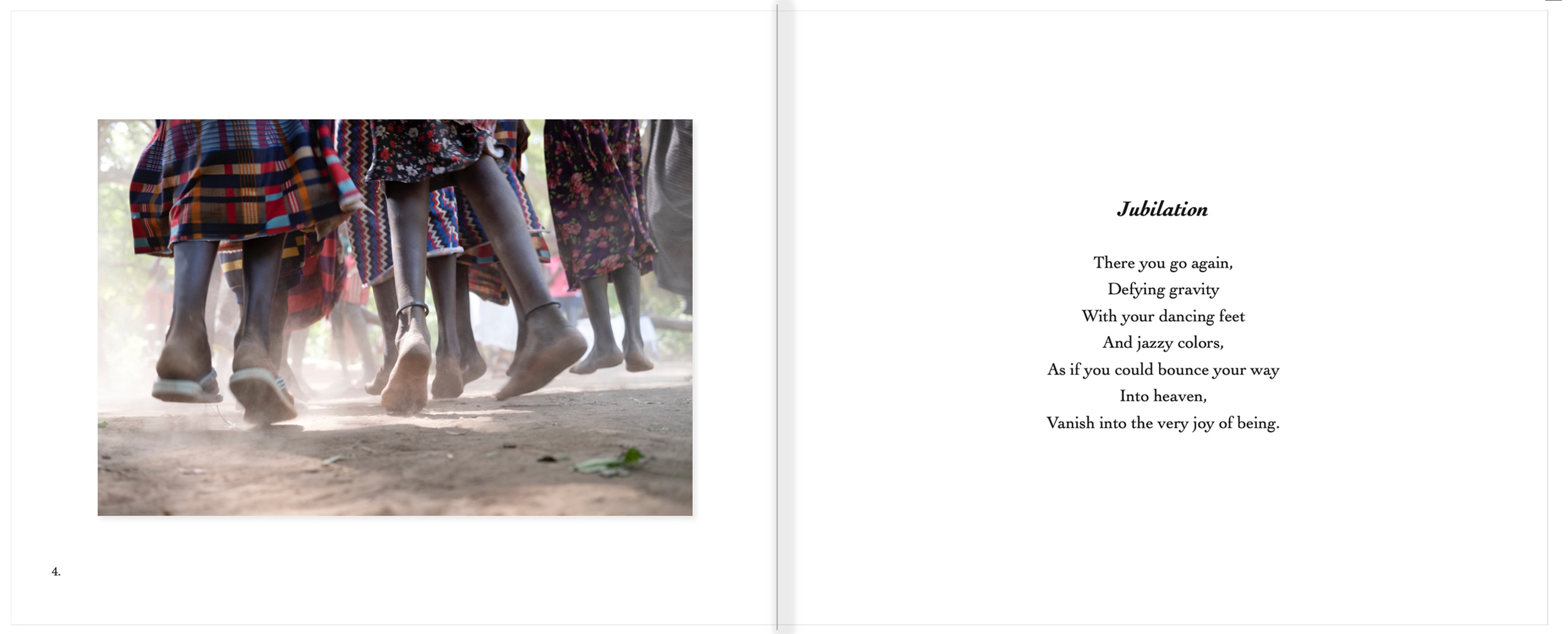
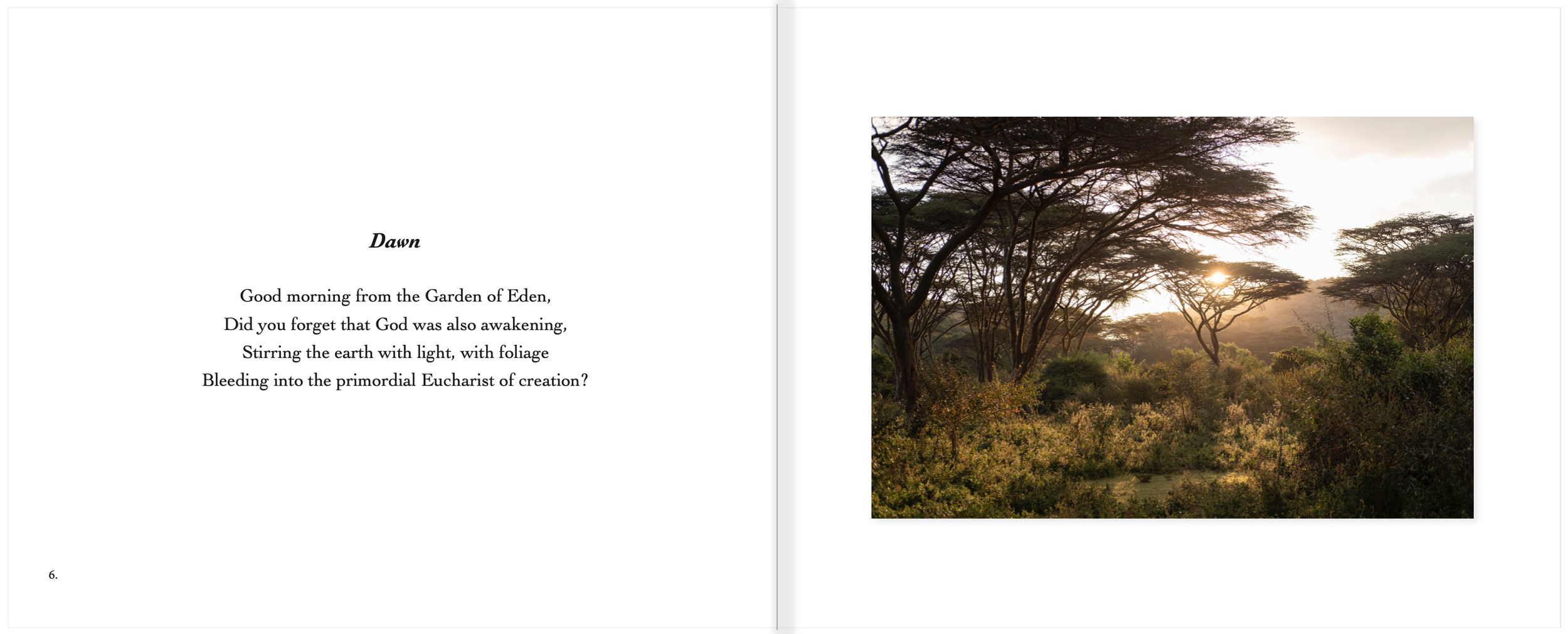
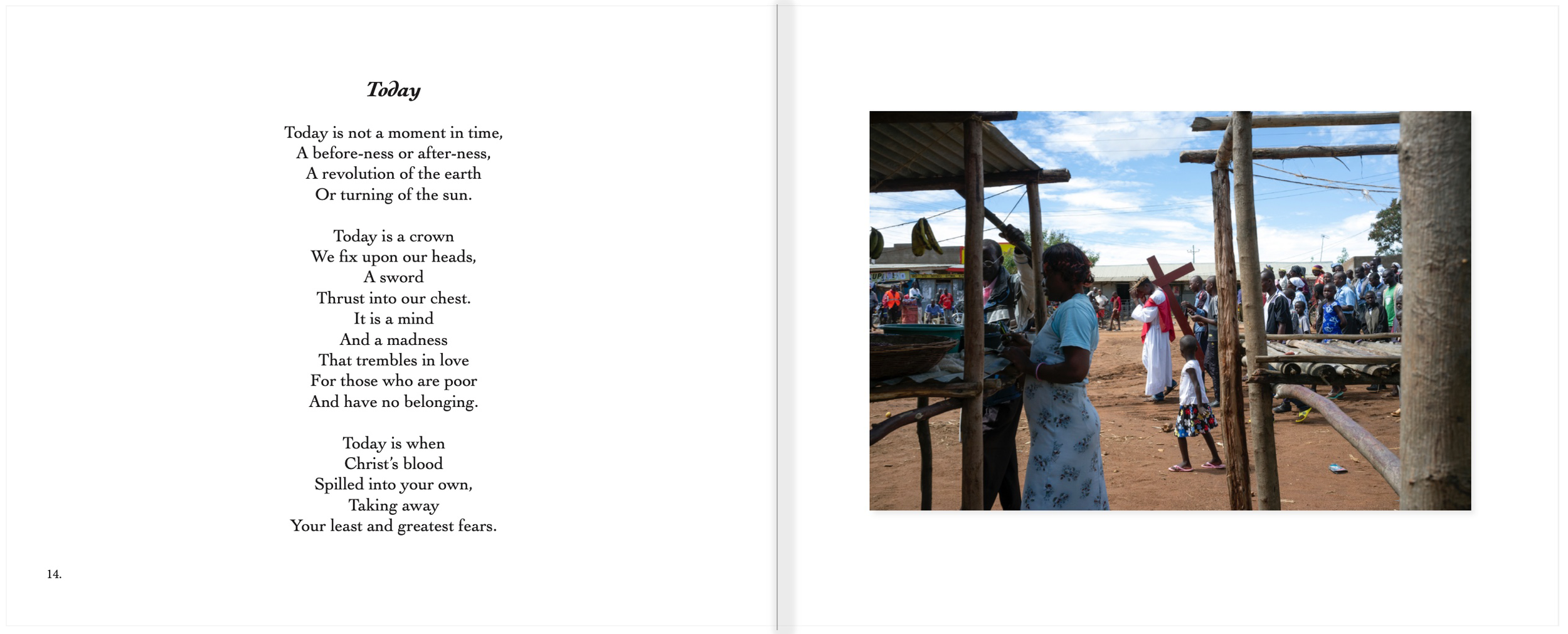
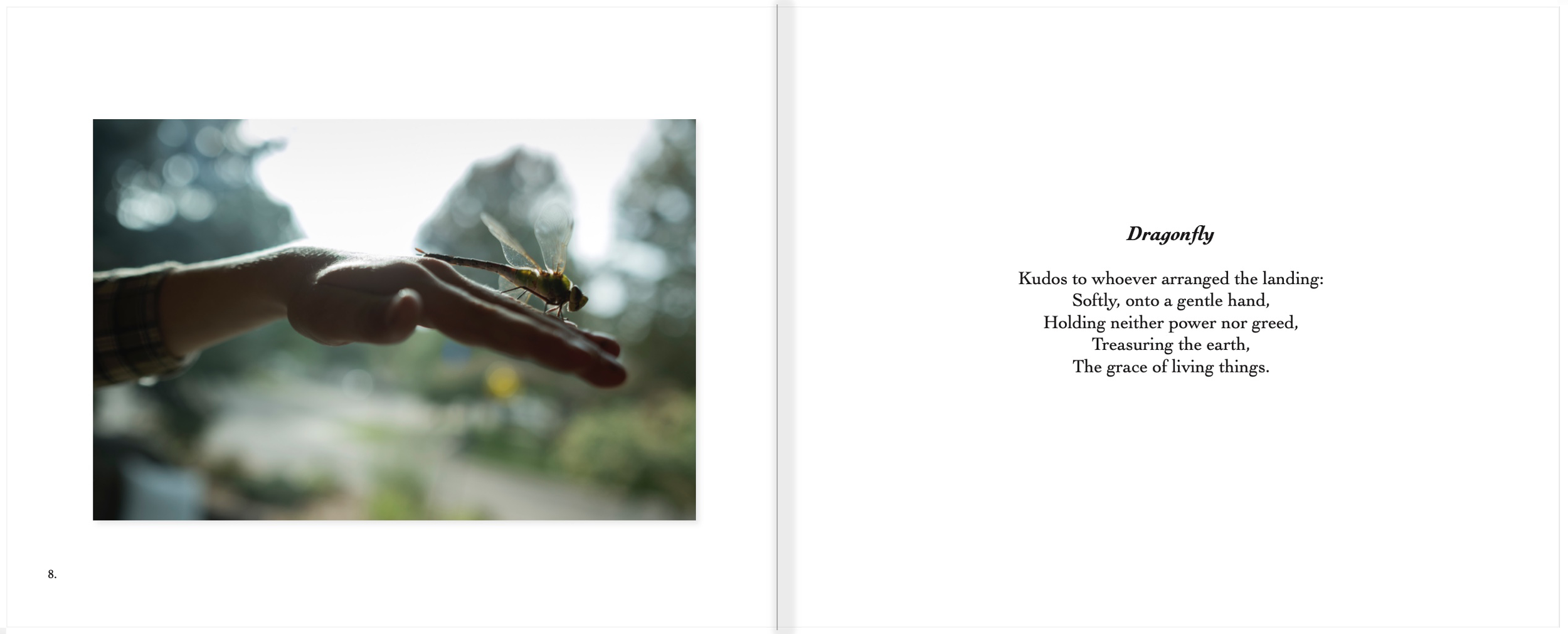
In honor of the mothers in our lives, this year for Mother’s Day we offer you a collaboration between Jeff James, MLI executive director and a gifted photographer, and me, Dr. George Mulcaire-Jones, founder and president. While Jeff expresses his faith and perspective through his camera, I find my voice in the power of words. We worked together to create an art book to grace your home, and to help you understand the motivation behind our work at MLI. We can send a book to you or anyone in your life with an eye for beauty and a contemplative spirit. You can order your book here:
Our work for the cause of mothers worldwide continues. In our Safe Passages training in January, we heard first-hand of the challenges that exist for so many during the birthing process.
In Uganda, it is estimated that 16 women die in labor or childbirth each day.
In rural areas, so often burdened with poverty and a poor maternal health care infrastructure, a woman bleeding from an obstetrical hemorrhage requiring surgery and blood transfusion may wait hours for transport to a hospital. . . and in that interlude may go into shock and die.
Dr. Jim Linn works with a team of Ugandan clinicians on methods to stop bleeding during a uterine hemorrhage.
Many health facilities have dedicated and talented physicians and midwives but lack basic resources for recognizing and treating obstetrical emergencies: working blood pressure cuffs, blood typing and crossmatching, anesthesia for Cesarean sections and resuscitation equipment for both mothers and newborns.
A delivery room, rural Ethiopia.
Through your generosity and support we were able to not only provide training to 102 physicians, midwives and nurses, but also provide life-saving equipment to 34 different hospitals and health centers providing obstetrical care.
After our training in Gulu, Uganda, we held a facilitator training workshop at St. Joseph Family Life Center on our “Journey of a Thousand Days” program, which focuses on providing a safe and healthy family environment for a child in those first 1000 days of life.
Masaka, Uganda – Mariam and Georgina at the St. Joseph Family Life Center
Among the lead facilitator couples were James and Miriam Gichuki. They were recently blessed with a child --- a beautiful girl they named Georgina (I like the sound of that name!). While Miriam’s labor and delivery went well, another woman in the adjoining room died at nearly the same time that Georgina was being born. She had come in from a distant health center after prolonged, obstructed labor and was bleeding heavily. There was a delay in getting blood and given her degree of shock, she died while in surgery. James spoke of how sad it was – to have in their room the cries and joy of a newborn child and in the adjoining ward the weeping of a family whose beloved wife and mother had just died.
We left Uganda with a heart both uplifted and broken. What an inspiration to be with our Ugandan colleagues, working side by side with them towards our shared goal of improving obstetrical care and reducing maternal deaths. We saw in one another’s eyes a sense of solidarity, a coming together for a greater purpose. At the same time, we heard the stories that break your heart – of those
maternal and newborn deaths that “didn’t have to be.”
So many of these stories begin with “If”:
If only we had an ambulance to get women to the hospital sooner.
If only we had ultrasound, we could have recognized there were twins and the first one was breech.
If only we could have recognized her shock sooner.
A heart uplifted and broken carries with it another element – resolve.
As the obstetrical caregivers left the training, they uniformly spoke of their determination to improve their quality of care. Our facilitators from Uganda, Kenya, and Tanzania resolved to expand their programs even further, promoting stronger marriages and healthier family life in places where access to resources for struggling families is often unheard of.
At Maternal Life, we too have a deeper sense of resolve. We are doubling our efforts to raise funds and awareness about the lack of resources for family-centered services in the developing world and the life-giving programs MLI offers.
As a part of that effort, we have put together a book: “'I Want, I Choose...' Prayers To A Merciful God,”
With compelling photographs taken by Jeff and meditative poems by George.
The book will make a great gift for Mother’s Day and for any other special occasion!
All proceeds from the sale of “I Want, I Choose...” will go to support the work of MLI.
We know we can count on you to put your order in today and support us for another Safe Passages!





Thank you for all your tremendous support – it truly honors the gift of mothers to the world.
~Hillary, Jeff, and George


